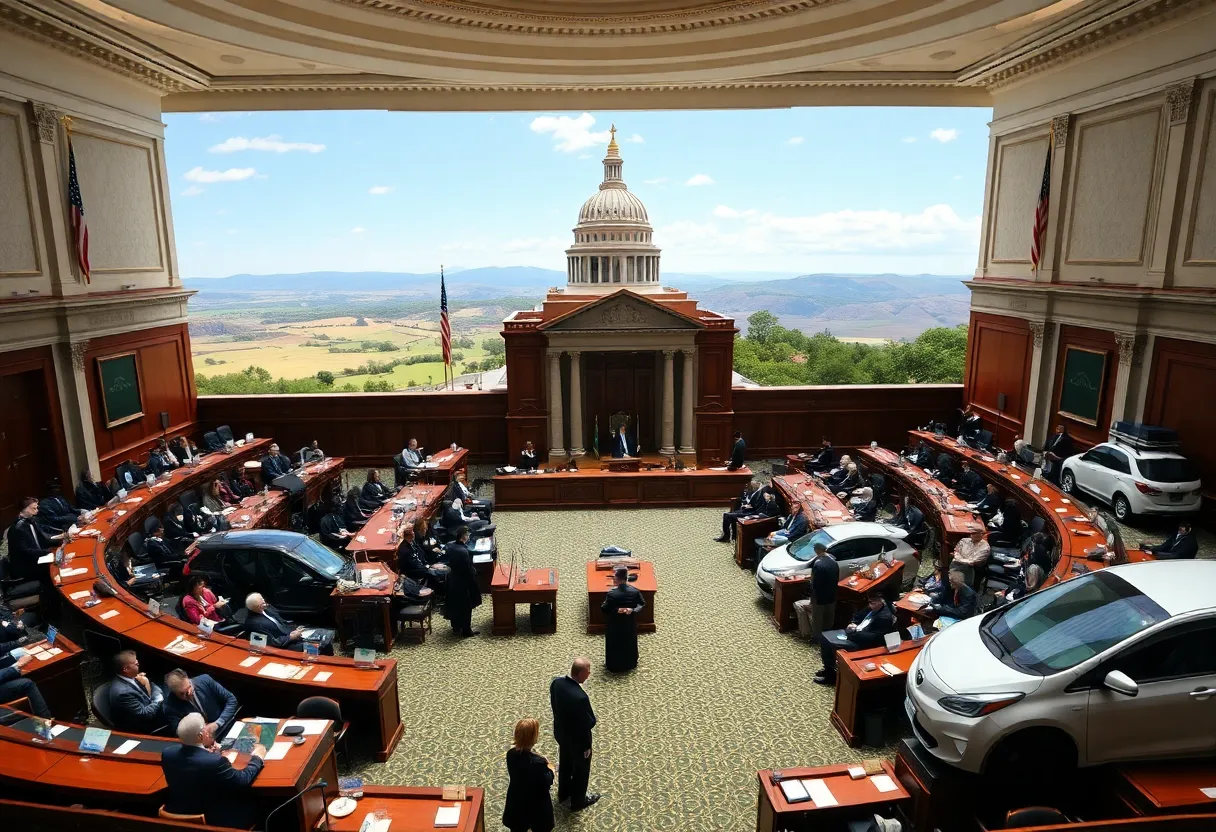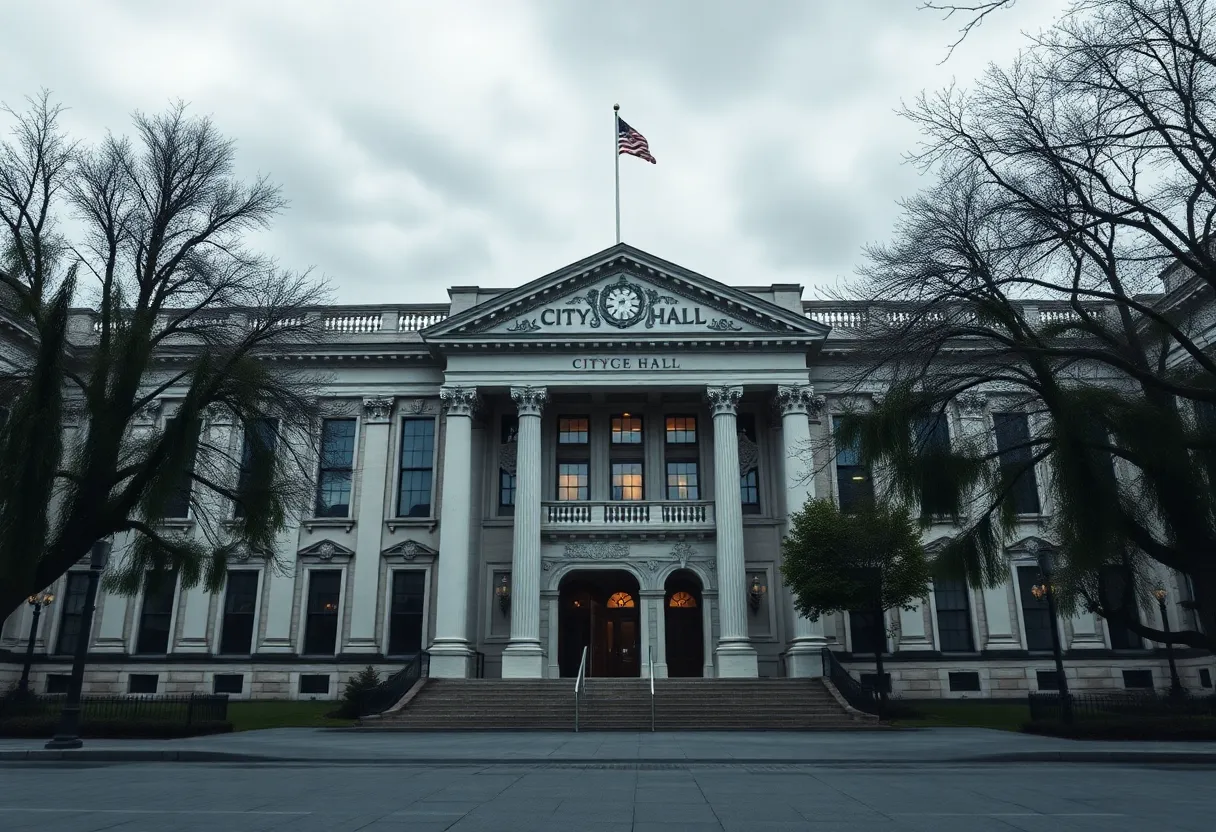News Summary
The U.S. Senate is set to vote on resolutions aimed at blocking California’s stringent vehicle emissions standards, including a proposal to phase out new gas-powered cars by 2035. Senate Republicans argue these regulations impose a nationwide electric vehicle mandate, while Democrats express strong opposition, highlighting implications for environmental policy. As California pushes towards its climate goals, concerns about its electric grid and infrastructure developments remain at the forefront of the debate.
U.S. Senate to Vote on Blocking California’s Vehicle Emissions Standards
California is at the center of a pivotal national debate as the U.S. Senate prepares to vote this week on resolutions aimed at blocking the state’s strict vehicle emissions standards. These resolutions include a historic proposal to phase out the sale of new gas-powered cars by 2035, a move designed to significantly reduce transportation emissions.
Senate Majority Leader John Thune from South Dakota announced the upcoming consideration of House-passed resolutions that seek to roll back California’s emissions regulations. A final vote is expected as soon as this week, adding urgency to an already heated discussion surrounding clean air regulations.
Concerns Raised by Senate Republicans
Senate Republicans assert that California’s rules are essentially imposing a nationwide electric vehicle mandate. Thune described the measures as an “improper expansion” of the Clean Air Act, arguing that they pose risks not only to consumers but also to the economy and energy supply. In this context, the Senate Parliamentarian and the U.S. Government Accountability Office have weighed in, concluding that California’s emissions policies are not subject to the Congressional review process being proposed.
Background on California’s Emissions Standards
California has a long history of being permitted to establish tougher emissions standards than those set by the federal government, primarily due to the state’s severe air pollution issues. In 2020, California Governor Gavin Newsom revealed an ambitious plan to ban the sale of new gas-powered vehicles by 2035. This plan mandates automakers to progressively increase their sales of zero-emission vehicles, targeting 43% of new sales by 2027, 68% by 2030, and achieving 100% by 2035. Notably, used gasoline cars, plug-in hybrids, and hydrogen-powered vehicles will still be available for sale.
The recent moves in the Senate occur in the context of prior federal actions; notably, the Trump administration had revoked California’s ability to enforce stricter emissions standards, a power that was restored under the Biden administration. In addition to California, over a dozen states have adopted similar emissions policies, although some, like Vermont, have paused enforcement.
Opposition from Senate Democrats
In light of the proposed GOP resolutions, Senate Democrats have expressed strong opposition, highlighting concerns not only about the legislation’s process but also its implications for future environmental regulations. The Senate Minority Leader criticized the method being used, describing it as a “nuclear” option that lowers the voting thresholds for legislative actions.
Challenges and Infrastructure Developments
As the debate unfolds, practical challenges related to California’s electric grid remain a focal point, particularly concerns regarding its capacity to support the anticipated rise in electric vehicle usage. Despite these challenges, California is making strides towards its aim of net-zero greenhouse gas emissions by 2045, alongside investments in expanding its electric vehicle charging infrastructure. Recent statistics reflect a growing trend among California residents towards electric vehicle ownership, with a significant percentage of all U.S. EV registrations originating from the state. Federally, there are currently tax credits available for EV purchases, though proposals from Senate Republicans may threaten future incentives.
In other developments, ride-sharing service Uber has indicated struggles to meet its electric vehicle goals due to high EV prices and inconsistent governmental support for EV policies. Locally, the city of San Francisco has embarked on a project to install curbside charging stations to enhance accessibility for residents who lack private garages. This program, spearheaded by the company it’s electric, aims to address charging access for those living in apartment buildings. The initial installations have begun on Fillmore Street, with public charging rates ranging from $1 to $5 per hour, providing critical support for urban electric vehicle owners.
California’s Long-Term Climate Goals
Looking ahead, California has set audacious climate goals, striving to ensure that 25% of private vehicles are electric by 2030, with aspirations for this figure to reach 100% by 2040. Achieving these targets will require a substantial increase in public charging stations to ensure a smooth transition to electric vehicles across the region.
Deeper Dive: News & Info About This Topic
- AP News: Senate to Vote on Blocking California’s Vehicle Emissions Standards
- San Francisco Chronicle: Electric Car Costs in California
- NBC Bay Area: Electric Vehicle Charging Program in San Francisco
- CBS News: First Curbside EV Chargers Installed in San Francisco
- CBS4 Indy: Senate Attempts to Block California’s Vehicle Standards
- Google Search: California Electric Vehicle Policies

Author: Anaheim Staff Writer
The Anaheim Staff Writer represents the experienced team at HEREAnaheim.com, your go-to source for actionable local news and information in Anaheim, Orange County, and beyond. Specializing in "news you can use," we cover essential topics like product reviews for personal and business needs, local business directories, politics, real estate trends, neighborhood insights, and state news affecting the area—with deep expertise drawn from years of dedicated reporting and strong community input, including local press releases and business updates. We deliver top reporting on high-value events such as major conventions at the Anaheim Convention Center, including NAMM and VidCon, exciting games at Angel Stadium and Honda Center, and developments at Disneyland Resort Our coverage extends to key organizations like the Anaheim Chamber of Commerce and Visit Anaheim, plus leading businesses in hospitality, entertainment, and innovation that power the local economy As part of the broader HERE network, including HERECostaMesa.com, HEREHuntingtonBeach.com, HERESantaAna.com, and HERELosAngeles.com, we provide comprehensive, credible insights into Southern California's dynamic landscape.




